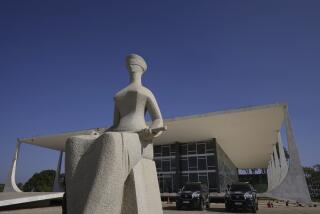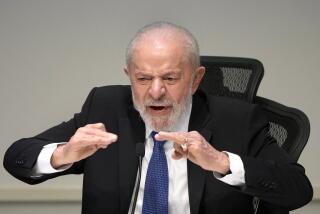Brazil Approves Direct Elections : Congress Unanimous in Supporting Reform
- Share via
BRASILIA, Brazil — The Brazilian Congress gave unanimous final approval Thursday to a sweeping constitutional amendment that gives the right to elect the country’s next president to about 75 million voters.
The amendment, approved at the end of an all-night session, gives illiterates the right to vote for the first time. It also legalizes the Brazilian Communist Party, which has been outlawed since 1947, and makes possible the formation of new political parties.
The action fulfills a pledge made by the late President-elect Tancredo Neves to restore full democracy to Brazil. Elected last January, Neves died April 21 before he could be inaugurated.
President Jose Sarney, who was elected vice president on Neves’ ticket, reiterated Neves’ pledge. Neves and Sarney were elected by an electoral college under rules prescribed by the authoritarian military regime that held power for 21 years.
The amendment, which is effective immediately, received preliminary approval late Wednesday by votes of 458 to 0 in the Chamber of Deputies and 62 out of a possible 69 votes in the Senate. The unanimous final vote occurred early Thursday morning.
Sarney, who legally could stay in office until 1991, has announced that he intends to limit his presidential term to four years, so the next election for president will be in 1988. The first direct popular elections will be held in November, when mayors of 31 major cities will be chosen. Under the country’s military rulers, the mayors of these cities were appointed, in the name of “national security.”
Military Pressure Cited
Last year, under heavy military pressure, the Congress was not able to gather the two-thirds majority necessary to adopt a constitutional amendment restoring a direct, popular vote for the presidential election in January. But the amendment went through with overwhelming support Wednesday and Thursday and was hailed as a victory by the leaders of political parties.
The last time Brazil had a presidential election by direct popular vote was in 1960, when 14 million voters cast ballots and elected Janio Quadros, a former mayor and governor of Sao Paulo state. Quadros resigned five months after taking office in a failed attempt to force Congress to grant him special powers.
Quadros was succeeded by his vice president, Joao Goulart, who belonged to another party, the leftist Brazilian Labor Party. Goulart’s close ties to the union leadership, then dominated by the Communist Party, generated strong military resistance to his taking office.
A political compromise allowed Goulart to take office but growing student unrest, labor strikes and conflicts over land issues led Brazil’s conservative political forces and much of the business community to support his overthrow by the military in 1964.
Civil Rights Suspended
The military regime suspended the civil rights of thousands of political and labor leaders, crushed urban guerrilla groups with emergency security decrees and limited the power of Congress and the state governors.
But with Brazil going into a deep economic recession in 1982, moderate military leaders decided on a gradual restoration of democratic civilian rule. The military could not agree on a civilian candidate to succeed President Joao Baptista Figueiredo, a former army general, but the moderate opposition, represented by Neves, proved acceptable to the military.
The congressional decision to include illiterates in the voting amendment resolves a controversy that has gone on since Brazil’s 1946 constitution excluded them from voting. According to the 1980 census, there are about 15 million illiterates in the country, where the voting age for men and women is 18.
With the inclusion of illiterates, the potential electorate for a presidential election in 1988 would rise to an estimated 75 million people. The population of Brazil is projected to be 155 million by then.
Communists Seek Legality
The restoration of legality to the Communist Party and other Marxist splinter groups that seek political registration was made possible by the constitutional amendment. It says that the country’s Electoral Court may register any “democratic” political movement by gathering signatures representing voters in at least five states.
In the present Chamber of Deputies, there are 14 members who acknowledge that they are members of the Communist Party, although they were elected as candidates for legally registered parties. One of these, Roberto Freire, is a candidate for mayor for Recife, capital of the state of Pernambuco, the largest state in Brazil’s northeast region.
On Thursday, the Brazilian Communist Party, founded in 1922 by Luiz Carlos Prestes, made an official declaration telling the court that it supports democracy and the constitution. This was published in the official gazette, a preliminary to recognition of legality.
As a result of the party’s declaration, and the fact that the constitutional amendment removes a ban on parties that “depend on external support,” the Electoral Court is expected to register the Communists.
Other major new parties are also in formation, including the Liberal Party, which is part of the coalition that supports Sarney. The Liberals have some key Cabinet ministers, such as former Vice President Aureliano Chaves as minister of mines and energy, and nine state governors. But they could not previously be registered officially under rules set up by the military restricting party organization.
More to Read
Sign up for Essential California
The most important California stories and recommendations in your inbox every morning.
You may occasionally receive promotional content from the Los Angeles Times.










